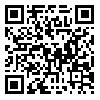Volume 14, Issue 4 (July & August 2023)
BCN 2023, 14(4): 479-490 |
Back to browse issues page
Esmail Soltani *1 

 , Seyed Abdolmajid Bahrainian2
, Seyed Abdolmajid Bahrainian2 

 , Ali Farhoudian3
, Ali Farhoudian3 
 , Abbas Masjedi Arani2
, Abbas Masjedi Arani2 
 , Latif Gachkar4
, Latif Gachkar4 




 , Seyed Abdolmajid Bahrainian2
, Seyed Abdolmajid Bahrainian2 

 , Ali Farhoudian3
, Ali Farhoudian3 
 , Abbas Masjedi Arani2
, Abbas Masjedi Arani2 
 , Latif Gachkar4
, Latif Gachkar4 


1- Research Center for Psychiatry and Behavioral Sciences, Shiraz University of Medical Sciences, Shiraz, Iran.
2- Department of Clinical Psychology, School of Medicine, Shahid Beheshti University of Medical Sciences, Tehran, Iran.
3- Department of Psychiatry, School of Medicine, Tehran University of Medical Sciences, Tehran, Iran.
4- Infectious Diseases and Tropical Medicine Research Center, Shahid Beheshti University of Medical Sciences, Tehran, Iran.
2- Department of Clinical Psychology, School of Medicine, Shahid Beheshti University of Medical Sciences, Tehran, Iran.
3- Department of Psychiatry, School of Medicine, Tehran University of Medical Sciences, Tehran, Iran.
4- Infectious Diseases and Tropical Medicine Research Center, Shahid Beheshti University of Medical Sciences, Tehran, Iran.
Abstract:
Introduction: The aim of the present study was to examine the effectiveness of acceptance and commitment therapy (ACT) on symptom severity, fear of negative evaluation, quality of life (QoL), and the mediating role of acceptance, cognitive fusion, and value among patients with social anxiety disorder (SAD).
Methods: Thirty patients diagnosed with SAD were randomized in the intervention (n=15) or waiting list groups (n=15). The social phobia and Anxiety inventory (SPAI), brief fear of negative evaluation scale (BFNE), World Health Organization quality of life (WHOQoL) scale, social anxiety-acceptance and action questionnaire (SA-AAQ), cognitive fusion questionnaire (CFQ), and valued living questionnaire (VLQ) were administered before, immediately after, and at a one-month follow-up. Repeated measurement design was used in the intervention group to investigate the changes of mediation and outcomes variables in the pre-test, during treatment, and post-test. Twenty-four patients completed the study. Data were analyzed using one-way analysis of covariance (ANCOVA), multivariate analysis of covariance (MANCOVA), and repeated measurements.
Results: There were significant differences between the intervention and waiting list groups in the severity of symptoms (P=0.001), fear of negative evaluation (P=0.002), and QoL (P=0.03), as well as in terms of specific measures of SA-AAQ (P=0.001), cognitive fusion (P=0.001), an important section of VLQ (P=0.001). Repeated measurement results showed that acceptance and action of social anxiety and cognitive fusion had a mediating role in the severity of social anxiety, fear of negative evaluation, and QoL.
Conclusion: The results indicated the effectiveness of ACT for SAD and highlighted the mediator role of social anxiety, acceptance and action, and cognitive fusion in the severity of SAD.
Methods: Thirty patients diagnosed with SAD were randomized in the intervention (n=15) or waiting list groups (n=15). The social phobia and Anxiety inventory (SPAI), brief fear of negative evaluation scale (BFNE), World Health Organization quality of life (WHOQoL) scale, social anxiety-acceptance and action questionnaire (SA-AAQ), cognitive fusion questionnaire (CFQ), and valued living questionnaire (VLQ) were administered before, immediately after, and at a one-month follow-up. Repeated measurement design was used in the intervention group to investigate the changes of mediation and outcomes variables in the pre-test, during treatment, and post-test. Twenty-four patients completed the study. Data were analyzed using one-way analysis of covariance (ANCOVA), multivariate analysis of covariance (MANCOVA), and repeated measurements.
Results: There were significant differences between the intervention and waiting list groups in the severity of symptoms (P=0.001), fear of negative evaluation (P=0.002), and QoL (P=0.03), as well as in terms of specific measures of SA-AAQ (P=0.001), cognitive fusion (P=0.001), an important section of VLQ (P=0.001). Repeated measurement results showed that acceptance and action of social anxiety and cognitive fusion had a mediating role in the severity of social anxiety, fear of negative evaluation, and QoL.
Conclusion: The results indicated the effectiveness of ACT for SAD and highlighted the mediator role of social anxiety, acceptance and action, and cognitive fusion in the severity of SAD.
Keywords: Acceptance and commitment therapy, Social anxiety disorder, Social anxiety acceptance and action, Cognitive fusion, Valued living
Type of Study: Original |
Subject:
Clinical Neuroscience
Received: 2020/07/31 | Accepted: 2021/03/1 | Published: 2023/07/1
Received: 2020/07/31 | Accepted: 2021/03/1 | Published: 2023/07/1
| Rights and permissions | |
 |
This work is licensed under a Creative Commons Attribution-NonCommercial 4.0 International License. |


